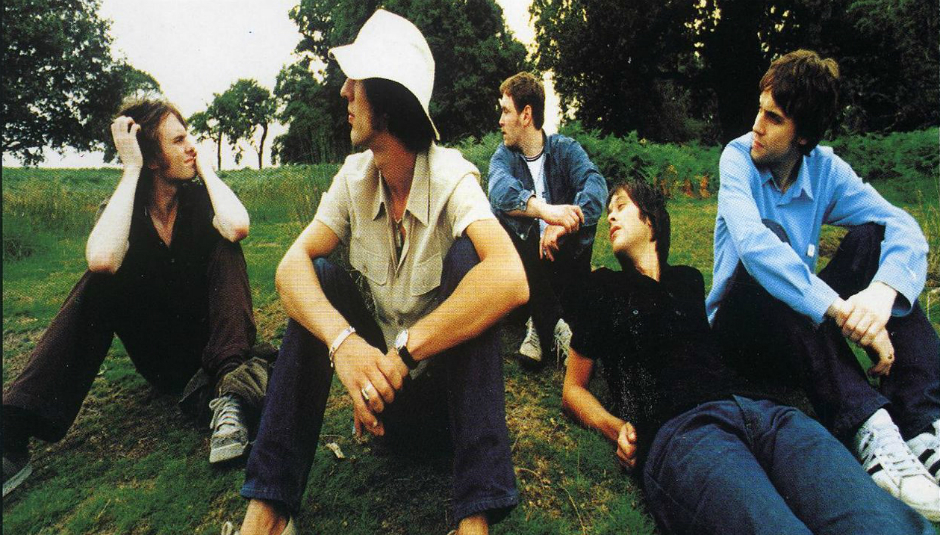The legend is well told. At Britain’s headiest cultural moment, one of her most indulgent, self-mythologising bands took their best swing at rock history immortality. A gaggle of music junkies from the declining Lancastrian mill town of Wigan, each member was the hero of the group in their own mind. Their respective egos pushed and pulled their fortune in and out of existence, but for a few months in the winter of 1996/7, they pooled their efforts and talents for long enough to hit their own jackpot.
The Verve's Urban Hymns, twenty years old this month, still sits pretty among the UK’s all-time top twenty best-selling albums, ahead of such ubiquitous contenders as 25, The Joshua Tree and White Ladder. It earned them the Best British Group and Best British Album prizes at that year’s BRITs, as well as Grammy and Mercury nominations. It scored them a number one single in ‘The Drugs Don’t Work’ at a time when only Oasis, U2 and Blur were taking guitars to such chart heights. Perhaps more remarkably, it became a hit album in the US, going platinum stateside on the way to its 10 million plus global sales. Suffice to say, when the band split after the release of previous album A Northern Soul, even Richard Ashcroft’s most quixotic ambitions couldn’t have reached this far.
The intervening time has done strange things to the legacy of Urban Hymns. Of course, the band have since returned and disappeared again, staying around just long enough to tour the festival headline circuit and release follow-up album Forth in 2008 to a mildly positive reaction. Britpop nostalgia – and whether you consider The Verve to be close enough to the musical definition of Britpop or not, in 2017 they very much fall under the historical umbrella – has gone through countless peaks and troughs in that time, perhaps currently experiencing a particular decline thanks to a post-Brexit reaction on the left against anything considered too jingoistic or patriotic.
The hedonistic maximalism of 1997 Britain feels as far away now as it ever has done, but listening back to Urban Hymns in 2017, you are reminded that The Verve were not making the same mistakes that Ashcroft’s old geezer-in-arms Noel Gallagher was when concurrently recording Be Here Now. The expansive, indulgent largesse came not from a drug-induced numbness to their own shortcomings, but from an insatiable desire to cram their entire record collection into one album-length statement.
Now, the obvious response to that statement is that in doing so, they forgot to obscure or sufficiently re-interpret a few of their ‘influences’. A prolonged court case resulted in the band relinquishing all of the royalties for ‘Bitter Sweet Symphony’ to the estate of Jagger and Richards after some confusion over whether they over-used a pre-agreed sample of an orchestral version of the Rolling Stones’ ‘The Last Time’. One listen to the 1965 David Whitaker arrangement of the Stones’ hit reveals just how much of ‘Bitter Sweet Symphony’ was already in place before The Verve started work on it. And this is not the only example of this on Urban Hymns: ‘The Rolling People’, one of the album’s standout psychedelic jams, clearly includes interpolations of Funkadelic’s ‘I Got a Thing, You Got a Thing, Everybody’s Got a Thing’ from 1970, as well as Aphrodite’s Child’s ‘The Four Horsemen’ from 1972. A track recorded during the Urban Hymns sessions, ‘C’Mon People (We’re Making It Now)’, seems to borrow liberally from the Four Tops’ ‘Reach Out I’ll Be There’ too. There may be others.
Nothing in music is new, but rarely does a band show their hand so clearly. You can make your own decisions about whether this is simply part of The Verve’s mission to inspire their listeners to expand their record collections and explore the recesses of 1970s prog and funk music, or in fact a lazy shorthand to creating distinctive music by jumping on the back of others’ hard work, but as this album passes into the annals of history alongside its forefathers, the, er, links, with its predecessors begin to sit a little less comfortably. The band that was so vocally obsessed with their legacy and their place in the narrative of rock lore did perhaps weaken their hand by allowing themselves to appear too greatly indebted to some of their heroes.
This issue aside, the 75 minutes of Urban Hymns to this day are bursting with life. The album’s defining tone is the all-out, multi-tracked space rock expanse of tracks like ‘Catching The Butterfly’ and ‘Space And Time’, songs that set the controls for the heart of the sun and watch them melt before their eyes. Ashcroft’s lyrics, so often embarrassingly earnest and dorm-room-philosophical, are the perfect match for the scope of the production. During the brief period when Nick McCabe was thrown out of the band, it is said that they lacked ideas for how to dress these somewhat under-written Ashcroft compositions. They turned to Youth to helm production duties, but felt that they weren’t making progress. Ashcroft, perhaps in frustration, turned back to McCabe, arms open wide, in the hope that his return would provide the alchemy needed to resuscitate their recording sessions. McCabe claims he knew instantly how to resolve the band’s mental block, and after hiring the lesser known Chris Potter to replace Youth, it was plain sailing for the remaining six weeks of production. With McCabe and Potter in charge, suddenly Spacemen 3 and Amon Duul became the touchstones that defined the album’s direction. Fans of what ifs can only ponder what might have happened if Bernard Butler had been able to stand Ashcroft for long enough to stay for the duration, rather than the two or three days that he managed in reality in the post-McCabe Verve landscape.
The trademark space euphoria is not the album’s only trick, however. The plaintive, exposed confession of ‘The Drugs Don’t Work’ found Ashcroft at his most mature, up to that point or ever since; the emotional ballad ‘One Day’ is mournful and vulnerable; ‘Come On’ is a driving rock song from another lineage, as hinted by the Liam Gallagher backing vocals; ‘Neon Wilderness’ is a hallucinogenic trip in slo-mo; ‘Sonnet’ is an old-fashioned troubadour love song. The track ‘A Song For The Lovers’ was recorded too during the sessions, in what McCabe has described as a version akin to The La’s or The Byrds, a tantalising thought that certainly sounds like an improvement on the anemic take that ended up on Ashcroft’s solo album ‘Alone With Everybody’. Its inclusion may have seemed jolting to the band at the time, but nevertheless, this is an album that glides between states of mind with ease, without ever entirely coming down to earth. ‘Bitter Sweet Symphony’, much like ‘Common People’, is driven by a message simple enough to survive the passing of trends, guaranteed to stick around for all of our lifetimes.
The common factor throughout it all is that The Verve, at least for long enough to make this album, were dreamers, bound to the idea that we can make everything better if we put our mind to it. It didn’t last – just one date into the US tour that followed the album’s release, McCabe was out again. Before the tour ended, Ashcroft had already signed a contract with Virgin to make three solo albums, effectively ending the natural life of the band. Acrimony continues to this day, with McCabe explaining in a recent DiS interview that there is still little consensus in the band about who should take credit for the album’s eventual state. What seems clear is that much of the credit should go to the extraordinary arrangements of the album’s biggest songs. The songs are credited to this day to Ashcroft alone, but it’s clear that this isn’t the work of any one man. Strip these tracks back and you have neither a hit album nor a great album. It is an album that for 95% of the band’s time on earth would have seemed impossible, both more expansive and accessible than their previous work, and one that required them to have gone through their first two albums as a band and to have stayed together. If we are to congratulate Ashcroft, it should be because he saw that the only way to make this masterpiece work was to swallow his pride and accept McCabe back into the fold. For a brief window, The Verve were true dreamers, and with Urban Hymns they were their best selves, a band united and moving forward as one.
The re-mastered 20th Anniversary edition of Urban Hymns is out on now via Virgin/UMC. Available as CD / Deluxe 2CD / Super-deluxe 5CD + DVD box / Super-deluxe 3LP box, it also comes with all of the accompanying b-sides, three hours of previously unreleased live material, the full May 1998 hometown show at Haigh Hall, Wigan (on both CD and DVD), and the documentary ‘The Video 96-98’, only ever previously available on VHS.






















